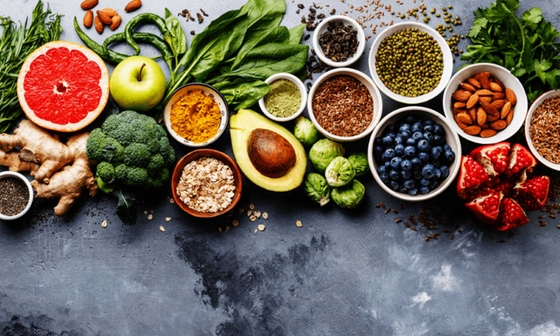
Fruit, vegetables and heart health
Key takeaways
- Fruit and vegetables can help lower your risk of heart disease, stroke, type 2 diabetes and some cancers.
- Eating fruit and vegetables can also help manage cholesterol levels and weight.
- Make fruit or vegetables a part of every meal.
- Include a variety of different coloured fruits and vegetables across the week.
How to boost your fruit and vegetable intake to help protect your heart
Eat plenty of fruit and vegetables
Why are fruits and vegetables important for heart health?
No matter if fresh, frozen or canned, choosing a variety of different fruits and vegetables provides us with fibre, vitamins and minerals to help keep our bodies healthy and lower the risk of heart disease.
In fact, research has shown that eating the recommended amount of fruits and vegetables every day (2 serves of fruit and 5 serves of vegetables) reduces the risk of coronary heart disease by 20%.1
That’s not all. Fruit and vegetables can help to protect against type 2 diabetes and some cancers. They can also help to manage cholesterol levels and weight.
How much should you be eating?
For good health, aim to eat:
- At least five serves of vegetables and,
- Two serves of fruit every day.
Children, pregnant women or breastfeeding mothers may need more or less. For more information on what's right for you, visit the Australian Dietary Guidelines or talk to an Accredited Practising Dietitian.
A serve of fruits and vegetables could be:

How to eat more fruits and vegetables
Small changes can make a big difference. Here are our top tips to help you enjoy more fruits and vegetable every day.
Use fresh, frozen, canned and dried fruit and vegetables
Fresh fruits and vegetables are great, but frozen, canned and dried options are just as healthy, and can be a convenient, budget-friendly option, especially when fresh isn’t available.
When buying canned fruits and vegetables, check the nutrition information panel to avoid added sugar and salt.
Make vegetables the star of your meals
Pack more vegetables into your meals:
- Aim to fill half your plate with vegetables at lunch and dinner
- Add a side salad to your meals
- Swap some of the meat in your meals with beans, peas, or lentils.
- Add grated carrot or zucchini to pasta sauces, or mix extra chopped vegetables into curries, stir fries or casseroles.
- Bulk up sandwiches or wraps with lettuce, tomato, cucumber, grated carrot and beetroot.
Have fruit and vegetables as handy snacks
There’s lots of ways to enjoy fruits and vegetables as snacks:
- Whole or pre-cut fruits
- A small handful of dried fruit
- Smoothies using whole fruits - try our Green Power or Mighty Mango smoothie
- Vegetable sticks with vegetable-based dips like hummus or beetroot dip
Top your breakfast with your favourite fruits and vegetables
Add extra flavour, fibre and other important nutrients:
- Top cereal, porridge or yoghurt with your favourite fresh, frozen or canned fruit.
- Be creative with toast - spread ricotta or nut-butter of choice on wholemeal toast and top with fruits like sliced banana, berries or apple.
- Add veggies like tomato, spinach, capsicum, and mushrooms to an omelette.
- Make your own baked beans for a fibre and protein packed start to the day. If choosing pre-made canned baked beans, look for low salt and sugar options.
- Need more ideas? Search ‘breakfast’ in our recipe hub!
Eat the rainbow: Add colour and variety to your meals
Eating a variety of colourful fruits and vegetables every day helps you get enough fibre, vitamins, and minerals. There are five main colour groups including purple/blue, red, orange/yellow, green, brown/white – each with its own unique benefits.
Try to include a mix of these colours each week. The more variety, the more nutrients!
Looking for more information on the science behind our recommendations?
We understand there is a lot of nutrition misinformation, and it’s important to find information from credible and trustworthy places. The Heart Foundation’s Heart Healthy Eating Pattern recommendations, and associated resources, are backed by the latest science and made with the unique needs of Australians in mind.
Curious about the evidence that informs our recommendations? Read more about our evidence reviews and position statements.
More healthy eating tools and resources
- We have plenty of resources to help you follow a heart-healthy eating pattern.
- Build your skills and confidence in the kitchen with our tips and tools for planning, shopping, and cooking healthy meals.
- Explore our full range of recipes for delicious, budget-friendly and easy to prepare heart-healthy meals you can make at home.
- Discover our collection of free recipe e-books, from ‘Family recipes on a budget’ to '5 Ingredient Recipes' plus many more.
- Get four weeks of easy-to-follow dinner recipes, shopping lists, tips and other helpful information to make healthy eating easy with our free Heart-Healthy Dinner Plans.
- Looking for more information? Explore our resources on healthy eating and recent articles.
References
1 Aune D, Giovannucci E, Boffetta P, et al. Fruit and vegetable intake and the risk of cardiovascular disease, total cancer and all-cause mortality-a systematic review and dose-response meta-analysis of prospective studies. Int J Epidemiol. 2017;46(3):1029-1056. doi:10.1093/ije/dyw319
You might also be interested in...

How to follow a heart healthy eating pattern
Follow these easy tips to boost your heart health and embrace a heart-healthy eating pattern.

Protein and heart health
Healthy proteins can part of a heart-healthy diet. However, each can impact your risk of heart disease differently. Find out more the best food protein sources.

Dairy and heart health
Explore how milk, yoghurt, and cheese affect heart health. Learn about dairy's role in a heart-healthy diet and the latest evidence-based recommendations.
Last updated12 May 2025
Last reviewed12 May 2025